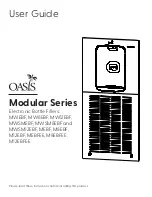
www.
hotwater .com 31
STRANGE SOUNDS
Possible noises due to expansion and contraction of some
metal parts during periods of heat-up and cool-down do
not necessarily represent harmful or dangerous conditions.
Condensation causes sizzling and popping within the
burner area during heating and cooling periods and should
be considered normal. See “Condensate” in this section.
Sediment collecting over time in the bottom of the tank
can result in “rumbling” or “percolating” sounds. Follow
the directions given in “Draining, Re
fi
lling And Flushing”.
OPERATIONAL CONDITIONS
Smelly Water
In each water heater there is installed at least one anode
rod (see Figure 1, item 22) for corrosion protection of the
tank. Some models will have an additional anode which
is connected to the hot water outlet nipple (see Figure 1,
item 23). Certain water conditions will cause a reaction
between the anode rod and the water. The most common
complaint associated with the anode rod is one of a “rotten
egg smell” in the hot water. The smell is a result of four
factors which must all be present for the odo r to develop:
1. A concentration of sulfate in the supply water.
2. Little or no dissolved oxygen in the water.
3. A sulfate reducing bacteria which has accumulated
within the water heater (this harmless bacteria is
nontoxic to humans).
4. An excess of active hydrogen in the tank. This is
caused by the corrosion protective action of the anode.
For certain water conditions, setting the gas control valve/
thermostat at 140°F can reduce the smell generated in
the water heater.
Note:
Under these conditions install a mixing valve to limit
the temperature of the water delivered to the system (see
“Water Piping” section).
Smelly water may be eliminated or reduced in some water
heater models by replacing the anode(s) with one of less
active material, and then chlorinating the water heater tank
and all water lines. Contact the local water heater supplier
or service agency for further information concerning an
Anode Replacement Kit and this chlorination treatment.
If the smelly water persists after the anode replacement
and chlorination treatment, we can only suggest that
chlorination or aeration of the water supply be considered
to eliminate the water problem.
Do not remove the anode leaving the tank unprotected. By
doing so, all warranty on the water heater tank is voided.
“Air” In Hot Water Faucets
HYDROGEN GAS: Hydrogen gas can be produced in
a hot water system that has not been used for a long
period of time (generally two weeks or more). Hydrogen
gas is extremely
fl
ammable and explosive. To prevent the
possibility of injury under these conditions, we recommend
the hot water faucet, located farthest away, be opened for
several minutes before any electrical appliances which
are connected to the hot water system are used (such
as a dishwasher or washing machine). If hydrogen gas is
present, there will probably be an unusual sound similar
to air escaping through the pipe as the hot water faucet
is opened. There must be no smoking or open
fl
ame near
the faucet at the time it is open.
High Water Temperature Shut Off System
This water heater is equipped with an automatic gas
shut-off system. This system works when high water
temperatures are present. Turn “OFF” the entire gas supply
to the water heater. The high temperature shut-off is built
into the gas control valve. It is non-resettable. If the high
temperature shut-off activates, the gas control valve must
be replaced. Contact your gas supplier or service agency.
















































